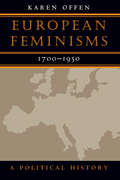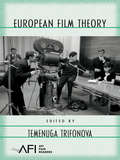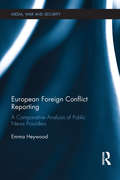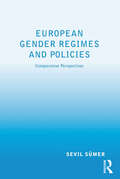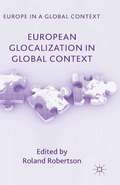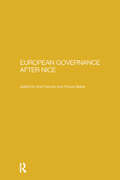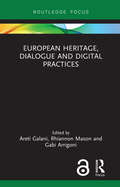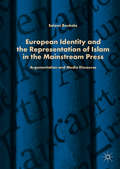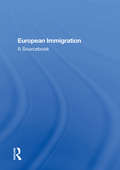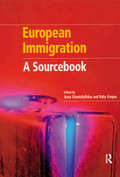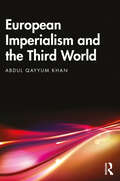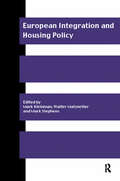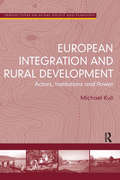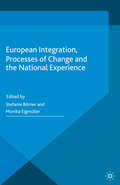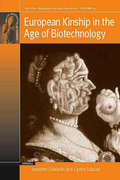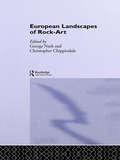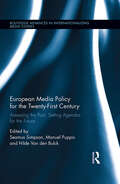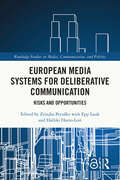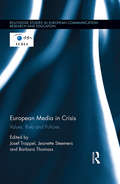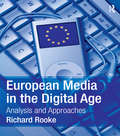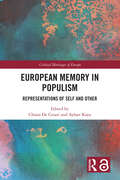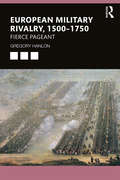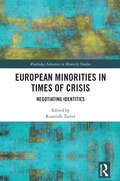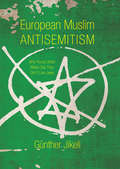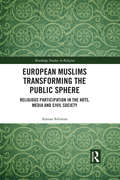- Table View
- List View
European Feminisms, 1700-1950: A Political History
by Karen OffenThis ambitious book explores challenges to male hegemony throughout continental Europe. It focuses especially on France, but it also offers comparative material on developments in the German-speaking countries and in the smaller European nations and aspiring nation-states. Spanning 250 years, the sweeping coverage extends from Portugal to Poland, Greece to Finland, Ireland to Ukraine, and Spain to Scandinavia--as well as international and transnational feminist organizations. The study has several objectives. For general readers and those interested primarily in the historical record, it provides a comprehensive, comparative account of feminist developments in European societies, as well as a rereading of European history from a feminist perspective. By placing gender, or relations between women and men, at the center of European politics, where the author argues that it belongs but from which it has long been marginalized, the book aims to reconfigure our understanding of the European past and to make visible a long but neglected tradition of feminist thought and politics. On another level, by providing a broad and accurate historical analysis, the book seeks to disentangle some misperceptions and to demystify some confusing contemporary debates about the Enlightenment, reason, nature, equality vs. difference, and public vs. private, among others. The author argues that historical feminisms offer us far more than logical paradoxes and contradictions; feminisms are about sexual politics, not philosophy. Feminist victories are not, strictly speaking, about getting the argument right, nor is gender merely "a useful category of analysis"; sexual difference lies at the heart of human thought and politics.
European Film Theory (AFI Film Readers)
by Temenuga TrifonovaEuropean Film Theory explores the ‘Europeanness’ of European film theory, its philosophical origins, the ‘culture wars’ between ‘Continental’ and ‘Analytical’ film theory and philosophy, the major discursive and epistemological shifts in the history of Continental film theory, the relationship between Continental philosophy of art and philosophy of history and European film theory. Writing from a range of disciplines and perspectives, the contributors to this new volume in the AFI FILM READERS series offer fresh interpretations of European film theorists and illuminate the political potential of European film theory.
European Foreign Conflict Reporting: A Comparative Analysis of Public News Providers (Media, War and Security)
by Emma HeywoodThis book explores the state of European foreign conflict reporting by public-sector broadcasters, post-Cold war and post-9/11. It compares the values of three television news providers from differing public systems: BBC’s News at 10, Russia’s Vremya and France 2’s 20 Heures. The book examines how these three news providers have reported and broadcast the ongoing Israeli–Palestinian conflict, which pre-dates both the change in East-West relations and the events of 9/11. In doing so, the work identifies and analyses the role of public and state-aligned broadcasters and illustrates how certain news values are consistently prioritised by the broadcasters and the effect this has on how news stories are portrayed. The book is divided into two parts. Part I focuses on 2006 to 2008 and provides a detailed quantitative overview of the broadcasters’ news values. Part II provides an update of the analysis by examining coverage of the war in Gaza 2014 and discusses the findings from audience research into perceptions of this latter war. This book explains that not only do hierarchies in news values exist in foreign conflict reporting but that they are never arbitrary and can be explained, in part, by the structure of the broadcasters and by events occurring within, or associated with, the reporting country, resulting in nationally differentiated perceptions of conflict throughout the world. This book will be of much interest to students of media studies, war and conflict studies, Middle East politics and international relations in general.
European Gender Regimes and Policies: Comparative Perspectives
by Sevil SümerComprehensive gender equality remains an unfulfilled goal in many European countries, in spite of important developments and challenges to the traditional gendered division of labour. This volume reviews recent advances of gender policies in different countries in the European Union, together with recent empirical data on gender relations in the labour market and within families. It adopts an international and interdisciplinary perspective through its use of qualitative and quantitative data, and a comprehensive theoretical framework. Particular attention is paid to the latest developments in the field of gender equality in different Scandinavian countries - countries which are customarily seen as forerunners in the area. The title culminates with an in-depth discussion on the possibility of converging alternate gender policy regimes in Europe.
European Glocalization in Global Context (Europe in a Global Context)
by Roland RobertsonThis book consists of a collection of essays that deal with glocalization in Europe, including the idea of Europeanization as glocalization. The contributors deal with a range of topics including migration, media, football, beauty, Christianity, democracy and the European Union.
European Governance After Nice (Waseda/routledgecurzon International Ser. #Vol. 4)
by Koji Fukuda and Hiroya AkibaWhat is the impact of institutional reform implemented by the Nice Treaty on European Governance? What should be done to enhance democratic legitimacy in the EU? This book provides an up-to-date guide to understanding the European Union as an institution. Globalisation has led to enormous changes in the international environment which, in turn, have demanded institutional reform of the European Union in the form of the Nice Treaty. European Governance After Nice scrutinises how, and to what extent, the treaty will contribute to the solution of existing problems, examining both its positive effects and its limitations and examines the reforms within the EU through political science, law and economics, in order to express the full extent of the different effects of the Nice Treaty on non-member as well as member countries. The contributors suggest that the threat of varying exchange rates in the future, when the Treaty has an expansionary effect on economic scale, will lead to a deepening interdependence between the excluded countries.
European Heritage, Dialogue and Digital Practices (Critical Heritages of Europe)
by Rhiannon Mason Areti Galani Gabi ArrigoniEuropean Heritage, Dialogue and Digital Practices focuses on the intersection of heritage, dialogue and digital culture in the context of Europe. Responding to the increased emphasis on the potential for heritage and digital technologies to foster dialogue and engender communitarian identities in Europe, the book explores what kind of role digital tools, platforms and practices play in supporting and challenging dialogue about heritage in the region.Drawing on fieldwork involving several European museums and heritage organisations, the chapters in this volume critically engage with the role of digital technology in heritage work and its association with ideas of democratisation, multivocality and possibilities for feedback and dialogic engagement in the emerging digital public sphere. The book also provides a framework for understanding dialogue in relation to other commonly used approaches in heritage institutions, such as participation, engagement and intercultural exchange. The authors map out the complex landscape of digitally mediated heritage practices in Europe, both official and unofficial, by capturing three distinct areas of practice: perceptions and applications of digitally mediated dialogues around heritage within European museums and cultural policy, facilitation of dialogue between European museums and communities through participatory design approaches and non-official mobilisation of heritage on social media. European Heritage, Dialogue and Digital Practices will be of interest to both scholars and students in the fields of heritage and museum studies, digital heritage, media studies and communication, the digital humanities, sociology and memory studies. The book will also appeal to policy makers and professionals working in a variety of different fields.
European Identity and the Representation of Islam in the Mainstream Press: Argumentation and Media Discourse
by Salomi BoukalaThis book combines media studies and linguistics with theories of national and supranational identity to offer an interdisciplinary approach to the study of European identity/ies and news discourses. Taking representations of ‘Islamist terrorism’ and Turkey’s accession to the European Union as case studies, it analyses the discursive construction of supranational European identity through the discursive distinction of ‘Us’ and ‘Them’. Moreover, it compares the media’s representations of the ‘Other’ in different socio-political moments in Europe- from times of European integration (2004-5) to the European dystopia (2015-16) through the discourse analysis of specific Greek, British and French newspapers. This timely work synthesizes classic argumentative approaches and Gramscian thought in the study of media discourses by focusing on the Aristotelian concept of topos and introducing the concept of ‘hegemonic knowledge’. This pioneering work will appeal to scholars across the fields of linguistics, social anthropology, European politics, and media studies.
European Immigration: A Sourcebook
by Anna TriandafyllidouWho are Europe's immigrants? This innovative volume provides a comprehensive overview of the immigration situation in all 25 EU countries. Each chapter is written by an expert and follows a common structure, allowing direct comparisons to be made between countries. Chapters provide a clear focus in terms of the methods used, data collected, literature reviewed and research questions addressed, and draw on hard-to-obtain material, including sources not previously published in English. Each chapter concludes with a critical assessment of the present migration situation of the country in question and its future prospects. Substantive introductory and concluding chapters offer a general overview of immigration in Europe, which complements and contextualizes the analytical and comparative insights of the individual countries. The first reference volume to provide comprehensive coverage of the EU, European Immigration will be essential for library collections and for scholars and policy-makers in the field.
European Immigration: A Sourcebook (Research In Migration And Ethnic Relations Ser.)
by Anna Triandafyllidou Ruby GropasFully updated and containing chapters on the new EU member states and the attempt to form a common EU migration policy, this new edition of European Immigration: A Sourcebook provides a comprehensive overview of the trends and developments in migration in all EU countries. With chapters following a common structure to facilitate direct international comparisons, it not only examines the internal affairs of each member state, but also explores both migratory trends within the EU itself and the implications for European immigration of wider global events, including the Arab Spring and the world financial crisis.
European Imperialism and the Third World
by Abdul Qayyum KhanThis book presents a comprehensive overview of the evolution of imperialism in Portugal, Spain, the Netherlands, France, and Great Britain. It delves into the background of colonialization and focuses on the nature of the motives of necessity, utility, religion, and exploration and the modus operandi of the establishment of the colonies which required a substantial amount of capital. The volume discusses a wide range of themes, including the role of Spain as a Muslim colony; rise and fall of Spain as an imperial power; Portuguese discoveries and colonialization; conquests of Dutch companies of East India and West Indies; the French company of the Indies; British colonies in Americas, Africa, and Australasia; and English East India Company to showcase a holistic history of European competition for trade through wars in North America, South America, Africa, Australia, New Zealand, and Asia. This book will be of interest to general readers interested in the history of colonization, imperialism, Third World studies, post-colonial studies, international relations, defense and strategic studies, South Asian history, and European history.
European Integration and Housing Policy (Routledge/rics Issues In Real Estate And Housing Ser.)
by Mark Stephens Mark Kleinman Walter MatznetterThis book presents a series of debates arising from the housing needs of different EU countries. The authors address key issues by examining in turn: * the consequences of European integration for different housing markets * the impact of the Maastricht Treaty and other policy documents * the social consequences of integration including income distribution, homelessness and marginal housing estates * current housing policy in the Nordic countries and in Eastern Europe.
European Integration and Rural Development: Actors, Institutions and Power (Perspectives On Rural Policy And Planning Ser.)
by Michael KullTo understand fully the process of European integration, it is necessary to consider developments at the sub-national and local level. EU integration scholars have been examining the local level using the concept of multi-level governance (MLG) since the 1990s. While MLG was the first concept to scrutinize the position of local levels of public administration and other actors within the EU polity, it overestimates the degree of influence it ascribes to local levels, particularly as far as the rural is concerned. Focusing on Germany and Finland, with country specific information from all EU member states, this book combines MLG with the concept of structural constructivism, in order to reveal some of the hidden aspects of EU integration. Bringing together these concepts and methodologies and replacing mainstream theories of integration with this new approach, offers a more accurate picture of multi-level interaction in rural policy and of the impacts of European integration at the local level. By examining the Community Initiative LEADER+ and setting this within a discussion of the state and structure of rural development policy, this book looks at the challenges, opportunities and policy options which are available and have been implemented in rural development. It shows that these are often context dependent and that the future of rural development policies, their shape and institutional configuration depend on reforms put in place at all levels of governance. Finally, it argues that the MLG of rural development policy must be built with people who have the know-how and the (local) knowledge to implement development projects and who have made LEADER a success in the past.
European Integration, Processes of Change and the National Experience (Palgrave Studies in European Political Sociology)
by Stefanie Börner Monika EigmüllerIn order to better understand processes of European integration, this book offers a new perspective that compares past experiences of change to current transitional moments at the European level. It addresses key questions about European society, EU integration and social change to reveal the social construction of emergent polities and societies.
European Kinship In The Age Of Biotechnology
by Jeanette Edwards Carles SalazarInterest in the study of kinship, a key area of anthropological enquiry, has recently reemerged. Dubbed 'the new kinship', this interest was stimulated by the 'new genetics' and revived interest in kinship and family patterns. This volume investigates the impact of biotechnology on contemporary understandings of kinship, of family and 'belonging' in a variety of European settings and reveals similarities and differences in how kinship is conceived. What constitutes kinship for different publics? How significant are biogenetic links? What does family resemblance tell us? Why is genetically modified food an issue? Are 'genes' and 'blood' interchangeable? It has been argued that the recent prominence of genetic science and genetic technologies has resulted in a 'geneticization' of social life; the ethnographic examples presented here do show shifts occurring in notions of 'nature' and of what is 'natural'. But, they also illustrate the complexity of contemporary kinship thinking in Europe and the continued interconnectedness of biological and sociological understandings of relatedness and the relationship between nature and nurture.
European Landscapes of Rock-Art
by George Nash Christopher ChippindaleRock-art - the ancient images which still scatter the rocky landscapes of Europe - is a singular kind of archaeological evidence. Fixed in place, it does not move about as artefacts as trade objects do. Enigmatic in its meaning, it uniquely offers a direct record of how prehistoric Europeans saw and envisioned their own worlds. European Landscapes of Rock-Art provides a number of case studies, covering arange of European locations including Ireland, Italy, Scandinavia, Scotland and Spain, which collectively address the chronology and geography of rock-art as well as providing an essential series of methodologies for future debate. Each author provides a synthesis that focuses on landscape as an essential part of rock-art construction. From the paintings and carved images of prehistoric Scandinavia to Second World War grafitti on the German Reichstag, this volume looks beyond the art to the society that made it. The papers in this volume also challenge the traditional views of how rock-art is recorded. Throughout, there is an emphasis on informal and informed methodologies. The authors skilfully discuss subjectivity and its relationship with landscape since personal experience, from prehistoric times to the present day, plays an essential role in the interpretation of art itself. The emphasis is on location, on the intentionality of the artist, and on the needs of the audience. This exciting volume is a crucial addition to rock-art literature and landscape archaeology. It will provide new material for a lively and greatly debated subject and as such will be essential for academics, non-academics and commentators of rock art in general.
European Media Policy for the Twenty-First Century: Assessing the Past, Setting Agendas for the Future (Routledge Advances in Internationalizing Media Studies)
by Seamus Simpson Manuel Puppis Hilde van den BulckMedia policy issues sit at the heart of the structure and functioning of media systems in Europe and beyond. This book brings together the work of a range of leading media policy scholars to provide inroads to a better understanding of how effective media policies can be developed to ensure a healthy communication sector that contributes to the wellbeing of individual citizens, as well as a more democratic society. Faced with a general atmosphere of disillusionment in the European project, one of the core questions tackled by the volume’s contributors is: what scope is there for European media policy that can exist beyond the national level? Uniquely, the volume’s chapters are structured around four key policy themes: media convergence; the continued role and position of public regulatory intervention in media policy; policy issues arising from the development of new electronic communication network environments; and lessons for European media policy from cases beyond the EU. In its chapters, the volume provides enriched understandings of the role and significance of policy actors, institutions, structures, instruments and processes in communication and media policy.
European Media Systems for Deliberative Communication: Risks and Opportunities (Routledge Studies in Media, Communication, and Politics)
by Epp Lauk Zrinjka Peruško Halliki Harro-LoitEuropean Media Systems for Deliberative Communication explores how four dimensions of national media systems – the legal framework for freedom of expression and information, media accountability, journalism and audience media usage and competencies – contribute to or are detrimental to the success of deliberative communication.Drawing on a study of 14 European countries and their media systems, the volume provides comparative and individual perspectives to examine the social consequences of various types of media systems. By using fsQCA (fuzzy set qualitative comparative analysis), the authors relate deliberative communication to the legal framework for freedom of expression and freedom of information, media accountability, journalism and media usage and media competencies. The book shows how different combinations of conditions and contexts figure as risks or opportunities that are detrimental to, or supportive of, deliberative communication, measured with an original index on a European level.This book will interest scholars and students in communication studies, political communication, media and society, media sociology, global media studies, European Studies and journalism.
European Media in Crisis: Values, Risks and Policies (Routledge Studies in European Communication Research and Education)
by Josef Trappel Jeanette Steemers Barbara ThomassWhen the financial markets collapsed in 2008, the media industry was affected by a major slump in advertising revenues, and a formerly highly successful business model fell into a state of decay. This economic crisis has threatened core social values of contemporary democracies, such as freedom, diversity and equality. Taking a normative and policy perspective, this book discusses threats and opportunities for the media industry in Europe: What are the implications of the crisis for professional journalism, the media industry, and the process of political communication? Can non- state and non-market actors profit from the crisis? And what are media policy answers at the national and European level?
European Media in the Digital Age: Analysis and Approaches
by Richard RookeThis introductory textbook for Media and Communication Studies students is designed to encourage observation and evaluation of the European media in the digital age, enabling students to grasp key concepts and gain a broad and clear overview of the area. It also introduces the principal debates, developments (legislative, commercial, political and technological) and issues shaping the European media today, and examines in depth the mass media, digital media, the internet and new media policy. Understanding today's media scene from print to audiovisual needs a wider view and this book helps make comprehensible the European media within a broader global media landscape. The text is pedagogically rich and explores a variety of approaches to help the reader gain a better understanding of the European media world. Students are encouraged to start thinking about statistics, relating this to economics, analysing regulations, and combining media theories with theories of European Union integration. The book also includes the use of case studies, illustrations, summaries, critical reflections and directions to wider reading. The European Media in the Digital Age is recommended for all Media Studies students and is also of key interest to students of Politics and Policy, Business Studies, International Studies and European Studies
European Memory in Populism: Representations of Self and Other (Critical Heritages of Europe)
by Ayhan Kaya Chiara De CesariEuropean Memory in Populism explores the links between memory and populism in contemporary Europe. Focusing on circulating ideas of memory, especially European memory, in contemporary populist discourses, the book also analyses populist ideas in sites and practices of remembrance that usually tend to go unnoticed. More broadly, the theoretical heart of the book reflects upon the similarities, differences, and slippages between memory, populism, nationalism, and cultural racism and the ways in which social memory contributes to give substance to various ideas of what constitutes the ‘people’ in populist discourse and beyond. Bringing together a group of political scientists, anthropologists, and cultural and memory studies scholars, the book illuminates the relationship between memory and populism from different angles and in different contexts. The contributors to the volume discuss dominant notions of European heritage that circulate in the public sphere and in political discourse, and consider how the politics of fear relates to such notions of European heritage and identity across and beyond Europe and the European Union. Ultimately, this volume will shed light on how notions of a shared European heritage and memory can be used not only to include and connect Europeans, but also to exclude some of them. Investigating the ways in which nationalist populist forces mobilize the idea of a shared, homogeneous European civilization, European Memory in Populism will be of interest to scholars and students in the fields of European studies, heritage and memory studies, migration studies, anthropology, political science and sociology. Chapters 1, 4, 6, and 10 of this book are freely available as a downloadable Open Access PDF under a Creative Commons Attribution-Non-Commercial-No-Derivatives 4.0 license.
European Military Rivalry, 1500–1750: Fierce Pageant
by Gregory HanlonEuropean Military Rivalry, 1500–1750: Fierce Pageant examines more than 200 years of international rivalry across Western, Central, and Eastern Europe and the Mediterranean rim. The book charts the increasing scale, expenditure and duration of early modern wars; the impact of modern fortification on strategy and the movement of armies; the incidence of guerrilla war and localized conflict typical of the French wars of religion; the recourse by warlords to private financing of troops and supplies; and the creation of disciplined standing armies and navies in the age of Absolutism, made possible by larger bureaucracies. In addition to discussing key events and personalities of military rivalry during this period, the book describes the operational mechanics of early modern warfare and the crucial role of taxation and state borrowing. The relationship between the Christian West and the Ottoman Empire is also extensively analysed. Drawing heavily upon international scholarship over the past half-century, European Military Rivalry, 1500–1750: Fierce Pageant will be of great use to undergraduate students studying military history and early modern Europe.
European Minorities in Times of Crisis: Negotiating Identities (Routledge Advances in Minority Studies)
by Ruairidh TarvetOver the last decade, Europe has been struggling to cope with a series of significant and challenging global crises. Dramatic scenes from the so-called migrant crises, global financial crises, the Covid-19 pandemic and the war in Ukraine have sent shockwaves across Europe’s borders and have triggered drastic and sometimes even unprecedented responses from nation states. Caught between the shockwaves and counter-measures are Europe’s national minority communities. With little say or influence in national discussions on which measures to take in response to each crisis and often situated in peripheral or border regions, it is likely that these communities have been subjected to shifts in power balances and this may have even impacted their regional, national and transnational identities. By combining various sociological and anthropological methodologies with case studies from across northern, central, eastern and southern Europe, this book stresses the importance of listening to the unique concerns of minority communities in times of crisis. Starting in the Arctic Circle and working down in a reverse C-shape through Europe, each stop along the journey visits a different national minority community, where we learn about their multicultural, multilingual and transnational lifestyles and the distinct challenges they have faced in recent years. This book will be of interest to academics and researchers working in the areas of human geography, border studies, European studies, sociology, politics, minority studies and language studies.
European Muslim Antisemitism
by Günther JikeliAntisemitism from Muslims has become a serious issue in Western Europe, although not often acknowledged as such. Looking for insights into the views and rationales of young Muslims toward Jews, Günther Jikeli and his colleagues interviewed 117 ordinary Muslim men in London (chiefly of South Asian background), Paris (chiefly North African), and Berlin (chiefly Turkish). The researchers sought information about stereotypes of Jews, arguments used to support hostility toward Jews, the role played by the Middle East conflict and Islamist ideology in perceptions of Jews, the possible sources of antisemitic views, and, by contrast, what would motivate Muslims to actively oppose antisemitism. They also learned how the men perceive discrimination and exclusion as well as their own national identification. This study is rich in qualitative data that will mark a significant step along the path toward a better understanding of contemporary antisemitism in Europe.
European Muslims Transforming the Public Sphere: Religious Participation in the Arts, Media and Civil Society (Routledge Studies in Religion)
by Asmaa SolimanAnti-Muslim voices have become louder in many places in the midst of ongoing atrocities undertaken in the name of Islam. As a result, much of the creative participation of Western Muslims in the public sphere has become overshadowed. This tendency is not only visible in political discussions and the media landscape, but it is also often reflected in academia where research about Muslims in the West is predominantly shaped by the post 9/11 narrative. In contrast, European Muslims Transforming the Public Sphere offers a paradigm shift. It puts forward a new approach to understanding minority public engagement, suggesting that we need to go beyond conceptualisations that look at Muslims in the West mainly through the minority lens. By bringing into dialogue minority-specific and non-minority specific concepts, the book offers a relevant complement. Using young German Muslims engaged in media, the arts and culture and civil society as ten case studies, this book utilises the concepts of counterpublics and participatory culture to re-examine Muslims' engagement within the European public sphere. It presents a qualitative analysis, which has resulted from two years of ethnographic fieldwork and participant observation, in-depth interviews and primary source analysis of material produced by the research participants. This book is a unique insight into the outworking of multiculturalism in Western Europe. It illustrates the many-sidedness of young Muslims’ public contributions, revealing how they transform European public spheres in different ways. Therefore, it will be a vital resource for any scholar involved in Islamic Studies, the Sociology of Religion, Religious Studies, Cultural Studies and Media Studies.
